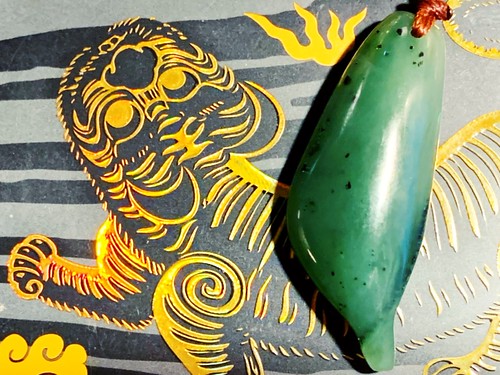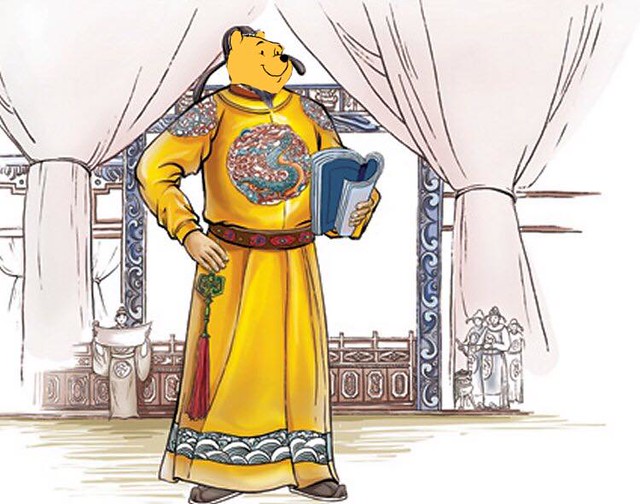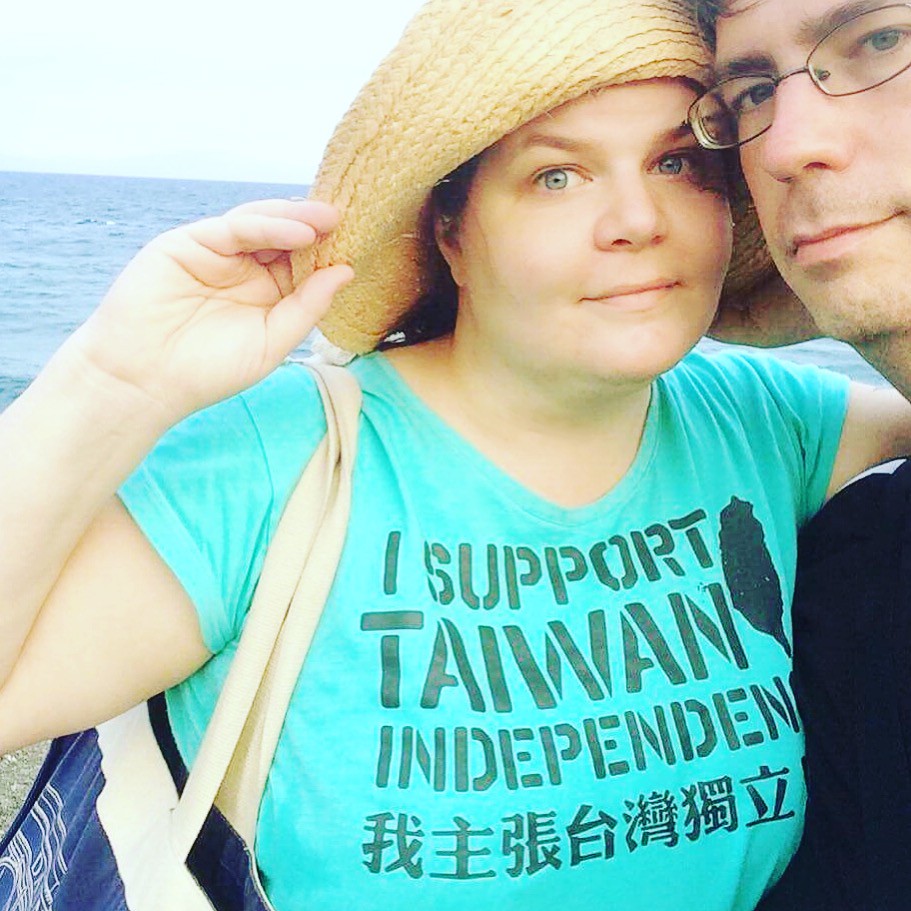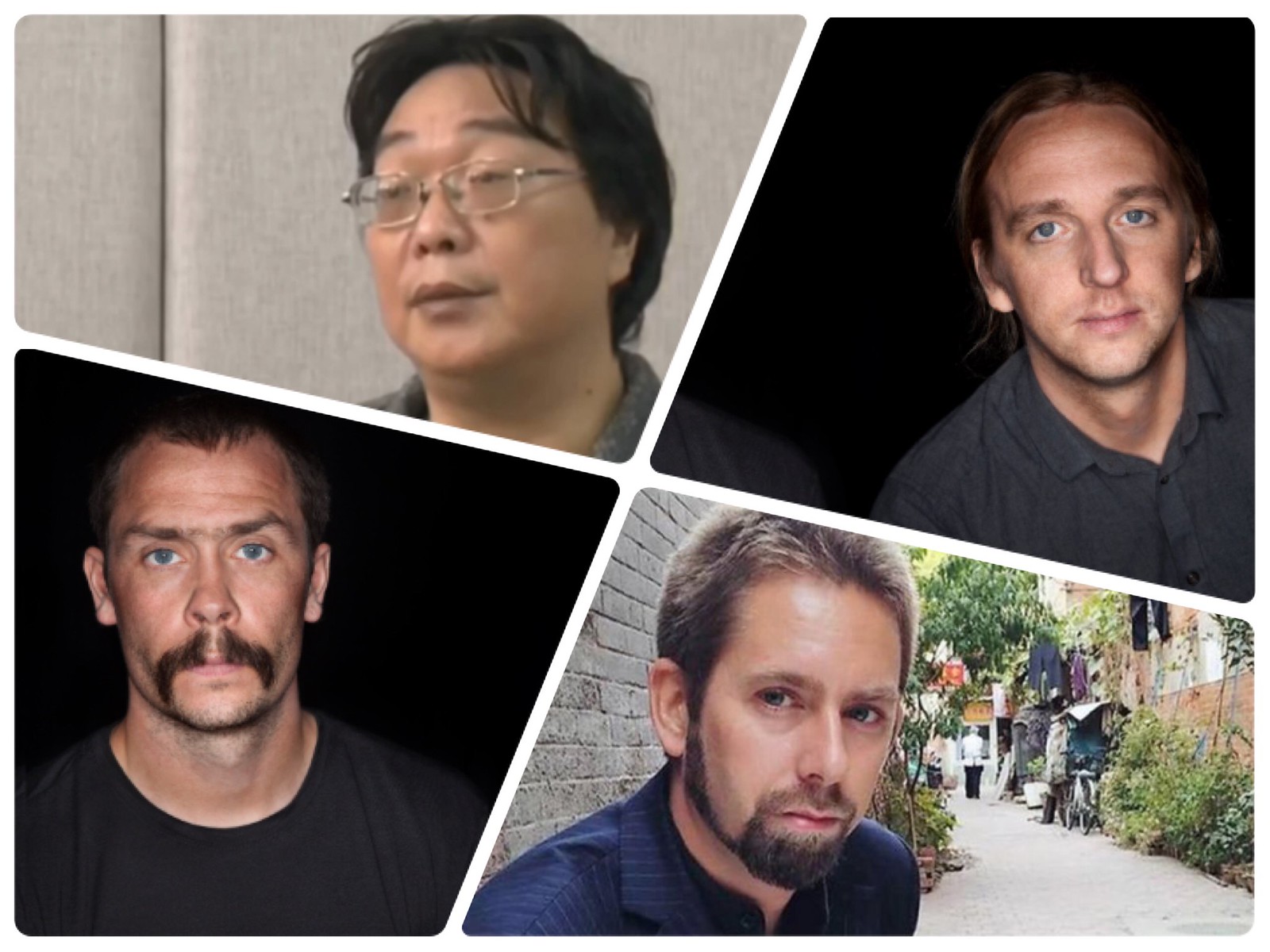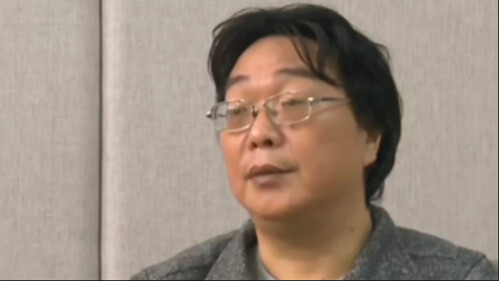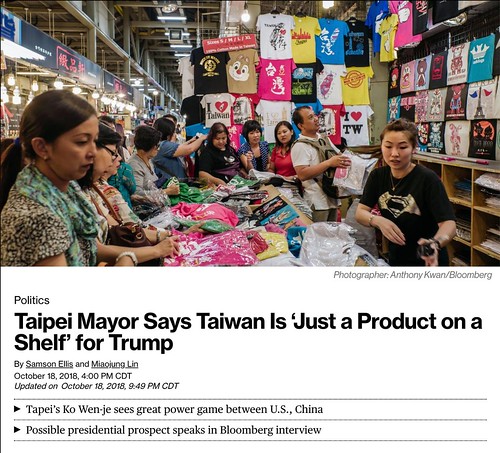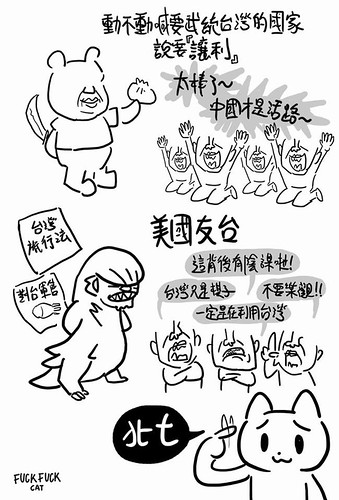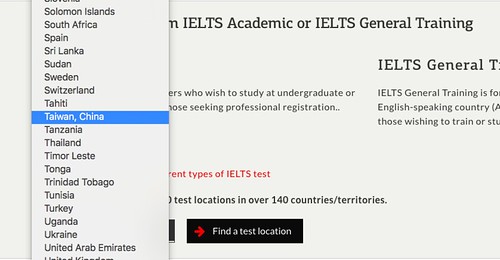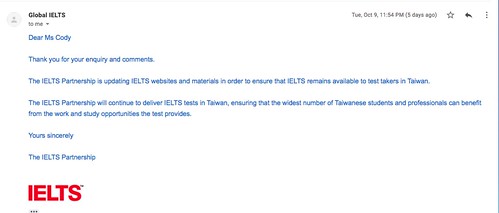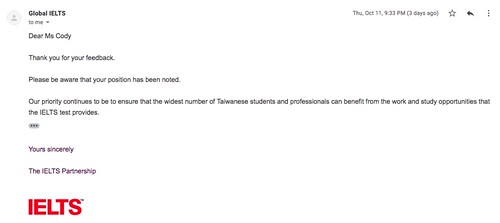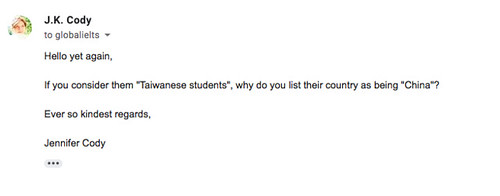Even when a story should be reported neutrally or with a critical eye to Chinese government's actions - as there is plenty of evidence of ill intent - the language used always exonerates Beijing and invites the reader to imagine that the other side is in the wrong. For example, here, we see language such as "soothe" and "calm" in the face of a "swipe" by a European leader (European Commission President Jean-Claude Juncker). To read that, you'd think that the Europeans were hysterical - MEOW! - as cool and collected President Xi sought peace. Criticism of China's actions comes much later and is phrased dismissively ("which some see as" is basically newspaper code for "you can ignore those people"), even when more investigation into the intent and impact of these actions are merited.
Gee, you'd almost think the international media is wary of criticizing China, even when it would be right to do so. Huh!
So what happens, then, when there is absolutely no way to avoid pointing out that the CCP is the one exacerbating tensions? When no accurate language is possible that implies that these tensions just magically rise on their own, or perhaps they are the fault of Taiwan (or some other country "taking a swipe" at China)?
Consider this example from a few days ago:
At 11 a.m., March 31, 2 PLAAF J-11 jets violated the long-held tacit agreement by crossing the median line of the #Taiwan Strait. It was an intentional, reckless & provocative action. We've informed regional partners & condemn #China for such behavior.— 外交部 Ministry of Foreign Affairs, ROC (Taiwan) 🇹🇼 (@MOFA_Taiwan) March 31, 2019
There's just no way around it: without provocation, the PLAAF made an incursion into...well, I'm not sure if we can call it "Taiwan airspace" exactly (someone with more expert knowledge is welcome to fill me in) but violating an agreement like this - even a tacit one - is in fact intentional, provocative and reckless. MoFA is absolutely right.
And there's no way to write about that which takes the blame off of the CCP...or is there?
Local and regional news is reporting on it, but the top article (in the Japan Times) manages somehow to make Taiwan look like it's overreacting, when it absolutely isn't:
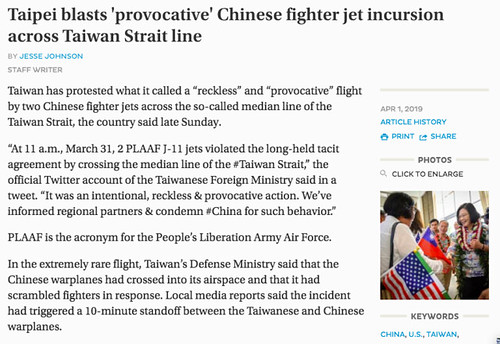
"Provocative" in quotes can mean that they're just quoting MoFA's words, which is true, but they're called "scare quotes" for a reason: used this way they also imply that the words used don't accurately describe the situation. That's followed by "so-called" and "extremely rare" and a lot of talk about what China thinks, but none at all really about what Taiwan thinks and why it responded as it did. And while I'm happy they asked Bonnie Glaser about this, after some tired faff about the "renegade province" they go on to continue minimizing Beijing's actions as if to say "hey Taiwan, why so serious? It's not a big deal. Don't make this into a whole big thing - you wouldn't want to raise tensions, would you?"
When anybody who is aware of China's actions in the 1990s know that they were meant to scare newly democratic Taiwan into, um...not being democratic. You'll recall that there were also missile tests then, and they were intended as an oblique threat to Taiwan. It was terrifying and kind of a big deal. I remember hearing about it as a teenager in the US who had no relationship to or conception of Taiwan. It was a big deal then and it is a big deal now.
And that's not even getting into SCMP's use of language: "hardline" etc. - to make Taiwan look like the fire-starter. Plus this steaming turd:
Analysts in Taiwan said, while it remained to be seen how Beijing would react to the order to forcefully disperse any future incursion by PLA jets, Tsai could risk setting off a cross-strait conflict which might drag Washington into the situation [emphasis mine].
Excuse me, ahem.
HOW IS TSAI "RISKING SETTING OFF A CROSS-STRAIT CONFLICT" WHEN IT IS CHINESE PLANES STARTING THE CONFLICT??
Seriously, Lawrence Chung and Liu Zhen, what the hell is wrong with you?
Then there's this, from Channel News Asia:
Taipei hit out at China on Sunday (Mar 31) for what it said was a "reckless and provocative" incursion by two fighter jets across a largely respected line dividing the two sides in the Taiwan Strait [emphasis mine].
Excuuuuse me. No.
China hit out at Taiwan, not the other way around. Why do you lead with an implication that China's the one being provoked, rather than the provocateur? (The rest of the piece is a little bit better, giving some good reasons why Taiwan needs to procure better defensive capabilities and discussing Chinese pressure, though I wonder why they say Tsai will be "fighting" for re-election rather than merely "running").
Outside of Asia, the reporting has been spottier. The Washington Post (via AP), MSN, CNN and ABC News ran stories (mostly copies of each other) which are a bit better than the crap from SCMP and Japan Times. I'm not a fan of the use of "scrambled" (to me it connotes haphazard surprise with a whiff of incompetence) but I'm told it's the correct term. So...okay.
The New York Times ran a Reuters feed which has some of the usual Reuters junk, including this gem:
There was no immediate reaction from Beijing, which views Taiwan as part of its territory.
I...what?
Didn't Beijing do the action that Taiwan is reacting to? So why are you reporting it as though Beijing is not reacting to Taiwan? Is Beijing's reaction to Taiwan's reaction really so important that it needs its own one-line paragraph? Did I just use up one of my free NYT articles reading this garbage?
To their credit, the Washington Post and ABC News started out with strong reporting on what Taiwan thinks, rather than showing everything the issue through the CCP's preferred lens. Read those to see how it's done right (though WaPo's reporting dives into a little 1949 nonsense toward the end).
But BBC? The Guardian? Anyone else? Anyone home? Hello?
Silence.
(I Googled and checked the sites of each and found nothing; if I've missed something, let me know.)
Edit: BBC is in the game two days late with a bit more trash for the fire.
How do these growing tensions relate to the deepening differences between Washington and Beijing?
Huh - it's like they don't even care about how this might impact Taiwan or its 23.5 million people.
Taiwan - of course - is seen by Beijing as an inseparable part of China; its separation from the motherland merely a temporary phenomenon.
WHY "OF COURSE" AND WHY DID YOU ADD MORE JUNK TO THIS ALREADY JUNKY PREMISE?
This weekend's incursion by Chinese warplanes is a reminder of the dangerous Taiwan dimension as well.
There is no "dangerous Taiwan dimension", there is only the "dangerous Chinese expansionism dimension". Why are you making it sound as though this is somehow Taiwan's fault?
For everyone else, why aren't they reporting it?
Maybe they just didn't think it was big enough news, although you'd think an incursion over a tacitly-agreed border which prompted a 10-minute stand-off and a reaction from Taiwan that they will "forcefully expel" any further violations, in
Though I doubt it would be this purposeful, I have to wonder if they shy away from any reporting on China and Taiwan that makes China look bad. Even if the impulse to do so is subconscious, it seems that tensions must always be everyone's fault except China's.
Of course, though most media can't seem to wrap its head around the notion that Taiwan may have an opinion about this and that opinion matters, there seems to always be space to run stories about Beijing lashing out at the US as the reason why it bullies Taiwan (and then denying said bullying).
So we get headlines like "Chinese State Media Blames US For Stirring Trouble in Taiwan", because apparently Chinese propaganda is newsworthy on an international scale, but how Chinese incursions on Taiwan affect Taiwan isn't.
It's almost certainly not a war-starter, but it is a deliberate instigation. Leading up to the 2020 election we can expect to see more of them, as the CCP attempts to terrify the Taiwanese away from voting for the party that wants to guarantee their sovereignty, and into the arms of a pro-Beijing bloviator that China can manipulate. And, of course, it puts Taiwan in a tough position: respond and risk looking like they are overreacting, or ignore it, which basically gives them the green light to keep ramping up their provocations.
So why is half the world still reporting on it bewildering and frankly disconcerting ways that somehow make it sound as though this - even this! - is either not a big deal, or somehow Taiwan's fault?

